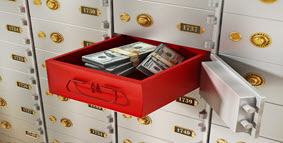
Escheatment: Where Unclaimed Assets Go
You think you have some money at a bank, but you can’t quite remember where it is. Or maybe you’ve just come across an unfamiliar bank statement or receipt from a safe deposit box. You may be wondering, how can I locate and retrieve money from my long lost account? To learn how, you need to know something about escheatment. Escheatment is the transfer of unclaimed funds or property to a state government.
It might seem impossible to misplace money or forget about a safe deposit box, but it happens to many of us. For instance, you may have opened an account designed for medium- to long-term saving, like certificates of deposit (or CDs), and then forgotten about it. A common reason someone may be searching for a lost account is because they are the executor of a deceased person’s estate or the caretaker for an ill relative or friend, and have come across a bank statement, certificate of deposit, or statement related to a safe deposit box in their loved one’s name.
Where do I start my search?
You can start by reaching out to the institution and asking whether they have an account in your name or in the name of the person who owns or owned the account. If you are looking for someone else’s account, the bank will probably ask you for documentation to prove that you have the right to access the information, like a power of attorney or death certificate and court appointment as executor of the deceased’s estate.
The bank may be able to tell you what happened to the account or safe deposit box. It may still be at the bank, or maybe the owner closed it years ago. Or the bank may have determined that the account or safe deposit box was abandoned, so they transferred the contents to the state. This process is called escheatment, and every state has laws requiring financial institutions to turn over abandoned property after a certain amount of time, usually between three to five years. If the account was closed a long time ago, the bank may no longer have any record of it.
What if the bank has failed?
If the bank recently failed, the FDIC or the bank that assumed the failed bank’s business may have the account or safe deposit box contents. After a period of time, the FDIC or the bank must transfer unclaimed property to the state. Federal law requires unclaimed deposit accounts to be transferred to the state after 18 months, and state laws differ on the period of time after which contents of safe deposit boxes must be transferred.
For information from the FDIC about failed banks and unclaimed property, start at FDIC Unclaimed Funds.
What if details about the account are lost?
You checked with the bank, and they have no record of the account. You remember opening an account several years ago, but can’t quite remember the name of the bank and you don’t have your old bank statements anymore. Now what can you do?
In this case, you may need to check with the state. You can search online for your state’s unclaimed property department, or you can start with FDIC’s unclaimed property information.
If you find your missing property, you can file a claim with the state, but don’t be surprised if they ask you to prove your identity in order to claim it. If you are the heir entitled to the property, you may need to prove that too. Sometimes assets transferred to a state unclaimed property office may have already been sold because there was no space left to store them. In most cases, the original owner or heirs still have the right to claim the proceeds from that sale.
Keep Accounts From Getting Lost
Keeping good records of your accounts can help prevent you from losing an account in the first place, and can help you or a loved one avoid having to go through a long and potentially fruitless search for lost assets. It’s a good idea to update your records about every year, including information about accounts that you have closed or moved to another institution. Destroy documentation for accounts you have closed as soon as you no longer need them.
Finally, it is also important to make sure your bank knows how to contact you. Any time you change addresses, make sure your bank has your current address on file. Many banks now have an online system where you can update your address. You may need to write to your bank to ensure the change is made.
So, if you find an old bank statement for an account you are not familiar with, don’t worry. The account may have already been closed years ago, but if it wasn’t, you may still find your lost account at the bank, with the FDIC, or with the state.
Beware of Fraud
If you would like someone to guide you through the claims process, there are companies that can help for a fee. However, you do not need anyone’s help to search the state for your unclaimed property, and you do not need a service to help you make a claim; anyone who tells you otherwise may be trying to take advantage of you. Be cautious of anyone who demands money up-front or charges fees for a service you can do yourself.
Additional Resources:
FDIC Unclaimed Funds
Securities and Exchange Commission (SEC) Escheatment Process
FDIC Consumer News: Time to Take a New Look at Your Money Habits
For more help or information, go to FDIC.gov or call the FDIC toll-free at 1-877-ASK-FDIC (1-877-275-3342). Please send your story ideas or comments to consumeraffairs@fdic.gov.
